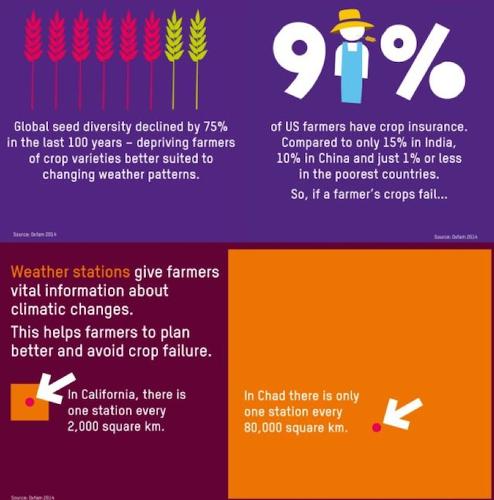

Oxfam just released a report explaining how climate change is going to affect food–and how we’re not ready for it.

Oxfam has highlighted 10 areas in which governments are falling far behind, including adaptation finance, gender equity, and social safety nets.

The organization predicts that people who spend most of their paychecks on food will be the worst affected, and access to school nutrition and guaranteed employment for the most vulnerable communities will become especially critical.


Oxfam just released a report explaining how climate change is going to affect food–and how we’re not ready for it.
-
 1
1 -
 2
2 -
 3
3
Climate Change Is Going To Make Us All Very Hungry, And We’re Not Doing Anything To Stop It
Impending food crises may arrive sooner than we think. Here are 10 ways the world–especially the developing world–is woefully unprepared
- 0 Notes
- /
- 0 Pin
- /
- 10 Plus
- /
- 104 Tweet
- /
- 6 Like
- /
- 6 Share
Next week, the Intergovernmental Panel on Climate Change, the scientific body that meets to release periodic assessments on the state of the world’s mutating climate, will release its fifth, and likely most concerning, report. Leaked copies have shown that governments, and especially poor countries, might have less time to adapt than previously thought.
One of the main the effects of this shortened horizon for climate disaster is that climate-charged severe hunger will be felt within the next 30 years. Oxfam estimates that, because of climate change, 25 million children under five will experience malnutrition or severe hunger in 2050. In response, the organization has highlighted 10 areas in which governments are falling far behind, including adaptation finance, gender equity, and social safety nets. All of which are going to make the hunger problem even worse.

In 2009, wealthy countries pledged to help poor countries reduce emissions and prepare for climate change by contributing $100 billion to a mitigation fund over several years. To date, however, those donations are far behind schedule. “Countries have only provided 2% in terms of the need,” explains Oxfam climate policy manager Heather Coleman. Without this money, countries set to experience the worst climate impacts are particularly ill-equipped.
A lack of policies that empower women will also weaken countries’ abilities to feed populations in the face of shifting climactic conditions. Women make up 43% of the worldwide agricultural workforce in the developing world, but they’re also often shut out from the systems that alert them to extreme weather warnings, which occur in almost exclusively male spheres.

In addition, Oxfam highlighted gaps in countries’ social safety nets as harbingers of crisis. The organization predicts that people who spend most of their paychecks on food will be the worst affected, and access to school nutrition and guaranteed employment for the most vulnerable communities will become especially critical.
Some 20,000 fishing households in the Philippines are already living that reality. After Typhoon Haiyan destroyed coastal communities, local fisherman have seen entire mangroves and coral reefs that host important fish stocks wiped out.
But while many of the harshest impacts will be felt in the developing world, wealthy countries won’t be exempt from the food crisis either. Food prices, according to Oxfam, will likely be some of the first shocks to the global system. The world experienced food price increases in 2008, 2010, and 2012, but the organization predicts that those will only become more severe in the next three decades–and more frequent.
“With the hundred-year drought we’ve seen in California, and California being the largest source of fruit and vegetables in the United States, that will clearly affect food prices in the U.S.,” Coleman says. “And those spikes lead to instability. We’ve seen studies linking some of the uprisings around the Arab Spring, for example, linked to rising food prices.”
[Image: Cracked earth via Shutterstock]

